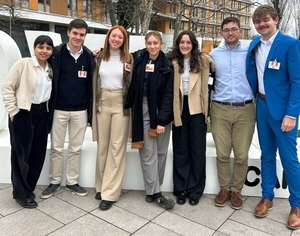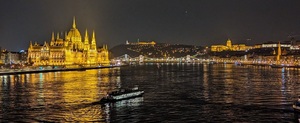Seven MPP students travel to Hungary for an international student event
A guest post by Matias Hanawa Simon, current student in our 2023-2024 MPP cohort

L-R: Zara Ali, Manuel Ressano Garcia, Claudia Marianelli, Paola Civitelli, Natalia Olguín Montemayor, Matias Hanawa Simon and Levi Zobel
Within the field of public policy education, the Network of Schools of Public Policy, Affairs, and Administration (NASPAA) Student Simulation Competition stands out as an annual global event, offering students a transformative and innovative learning experience. Participants from numerous universities around the world engage in the simulation, applying theory to real-world problems.
In this year’s edition, the NASPAA Simulation Competition was held in Budapest, Hungary, on Saturday 24 February. With a total of seven students from our MPP cohort attending (Paola Civitelli, Claudia Marianelli, Levi Zobel, Manuel Ressano Garcia, Natalia Olguín Montemayor, Zara Ali and I), we had the privilege of not only participating in the competition but also immersing ourselves in the captivating capital city.
Below, I share some brief highlights from our four-day trip last month.
Thursday 22 February:
After a day filled with tutorials, we began our journey to Charleroi Airport, Belgium, to catch our flight to Budapest. Upon arriving, we met up with Philip Pollak, an MPP alumnus residing in Budapest, who guided us to charming bars and shared some fascinating insights into the city’s history and Hungarian politics.
Friday 23 February:
Our exploration of the city continued: we admired the majestic architecture and enjoyed stops at charming vintage shops and restaurants. For lunch, we had lángos, a renowned Hungarian food (deep-fried flatbread adorned with various toppings). That evening, we attended a NASPAA networking event at the Ludovika University of Public Service, where we engaged with other participants from various countries, such as Kazakhstan, Belgium, and Hungary.
Anticipating the upcoming competition, we retired early to prepare and get a good night’s sleep.
Saturday 24 February:
The day of the competition was held at Ludovika University. After a morning session, participants were assigned to groups representing fictional countries, each tasked with addressing a policy issue arising from a migratory refugee crisis due to conflict. Deliberating the trade-offs between economic considerations and aiding refugees, as depicted in the Human Rights Index, we navigated several rounds.
A brief lunch break preceded an intensive one-and-a-half-hour preparation period for the policy brief and presentation. The top three countries, two of them having members from our cohort, were selected by judges to present their decisions, with evaluations determining the overall winner. Although none of our teams emerged victorious, we gained valuable insights from the judges’ feedback during the post-competition discussion.
After the long day, we headed to a simple street food restaurant for dinner, where we reunited with some Belgian students from the competition. Next door, there was an interesting alternative bar (as shown in the photo below), and the night concluded with a lively karaoke session!
Sunday 25 February:
Feeling slightly worse for wear from the previous day(!), we went for a leisurely walk before heading to the airport for our afternoon flight back to Maastricht.
To conclude, we’re very grateful that we had the opportunity to participate in this competition, since it not only provided us with a platform to apply our skills in a simulated environment but also offered a cultural and networking experience that enriched our understanding of global public service challenges.
See more photos from the trip in a post created by our MPP Student Ambassador Carmen Duran:
View this post on Instagram
ANY COMMENTS?
NOTA BENE
The opinions expressed here do not necessarily reflect the views of UNU.





